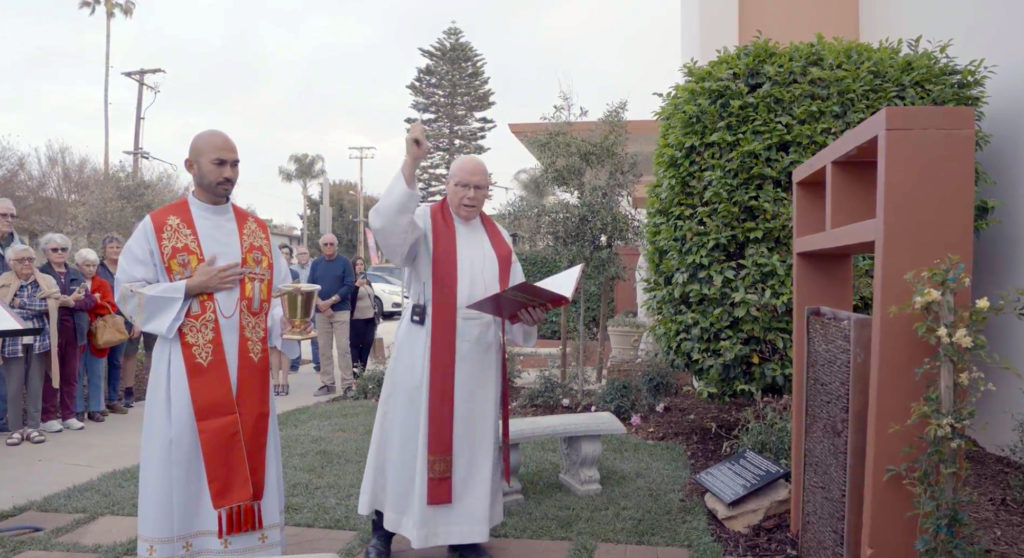The first thing you hear is the sound of water.
Water symbolizing purification. Prayer. Peace.
That’s what visitors to the Los Angeles Archdiocese’s second “Garden of Healing” at Our Lady of the Assumption Church in Ventura are meant to find. In other words, a space where those suffering from abuse or trauma can pray, find tranquility, and perhaps even begin to heal.
The latest garden was dedicated on April 25 with a special blessing by the parish’s pastor, Father Leon Hutton, as well as the recitation of a novena for healing from abuse, and a presentation by the archdiocese’s Victims Assistance Ministry.
Along with greenery and benches for reflection, there’s a water feature in the garden, a “weeping wall” fountain meant to evoke the sorrow of the abuse, but also the promise of renewal.
The archdiocese designated the first “Garden of Healing” in October 2022 at the St. Camillus Center for Spiritual Care in Los Angeles. The archdiocese intends to have at least one garden in each of its five pastoral regions, Archbishop José H. Gomez said.
“This garden is a promise to our brothers and sisters: we will never forget, and you are never alone; we go with you, always,” said Archbishop Gomez in 2022. “We pray that in the silent beauty of this garden, many may come to hear God’s voice, to know his love and compassion, and his longing to comfort them, to strengthen them, and to make them whole again.”
The inspiration for the healing gardens came largely from Joe Montanez, who was abused by a now-deceased priest when he was an altar boy at age 11 at St. Raphael Church in Santa Barbara. Montanez said his personal sanctuary to deal with his pain was tending to his family’s large garden.
After having spent more than 36 years teaching horticulture and landscape design at a middle school in Northridge, Montanez has lent his expertise in designing the two healing gardens in collaboration with the archdiocese’s Office of Victims Assistance Ministry.
The gardens were designed as spaces for those who didn’t feel ready or worthy to step inside a church due to ongoing feelings of anger, resentment, shame, or other reasons.
Montanez was asked to speak before the novena about his experience, which included years of anger, depression, and suicide attempts before finding a way back to God.
“I kept thinking, how am I going to get healed?” he said. “So many of us that have been abused, who do we trust? Who do we go to? I’m lucky because I never lost my faith.
“If you’re a parishioner and you’re confused, and you’re feeling what can I do to help, bring people to that garden and pray with them. If you know someone who was abused, bring them to that garden. It’s a healing garden.”
For more than four years, Montanez has been working on his recovery with Heather Banis, Ph.D., coordinator for the Victims Assistance Ministry. A major step was his desire to do public speaking, starting in April 2019 when he participated in a “Liturgy of Lament” at St. Dorothy Church in Glendora. It was the first public disclosure of what happened to him.
Back then, he was simply known as “Joe.” Now, he says he uses his full name “because I’m proud of who I am.”
During the event, both Banis and Hutton spoke of the magnitude that the abuse crisis has had on the Church and on victims and their families.
“It’s a tragedy,” said Hutton, who also serves as interim episcopal vicar for the Santa Barbara Pastoral Region. “Priests are supposed to be healers, they’re supposed to walk and accompany people, especially in their vulnerability. Not to take advantage of them.”
“This wounded our Church,” Banis said. “This is something that happened in one way or another to everybody. The betrayals of trust. Betrayed by the very people we’re supposed to be able to trust. Those become our struggles too.
“Even if I wasn’t personally abused, my parish, my archdiocese, my Church was. And we’re paying attention to that too. Efforts like the garden can speak to that.”
Now, Banis hopes that those suffering from the trauma of that abuse can find healing through contacting the Office of Victims Assistance Ministry to get help.
“I know that can feel impossible to even imagine,” she said. “So in a way what I’m called to do is to awaken that imagination; to help someone see that there’s the possibility of healing. And if they can do that, with us as their companions, to whatever degree we can bring Church and faith back to them, to whatever extent we can share that burden, then that’s what the Victims Assistance Ministry is there to do.”
The Archdiocese of Los Angeles stands against any sexual misconduct, supports victim-survivors of abuse and encourages anyone with information regarding these matters to call the Office of Victims Assistance Ministry at 800-355-2545 or email [email protected].

